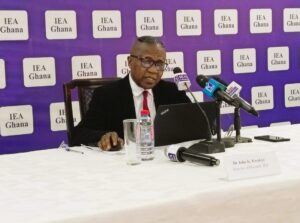ECG needs competent managers – IEA

The Institute of Economic Affairs (IEA) Ghana says the Electricity Company of Ghana (ECG) needs expert managers to tackle the inefficiencies in the Company’s operations.
Whilst the Institute maintained that ECG should remain state-owned, it stressed that the new crop of managers should be drawn from wherever applicable, both locally and internationally, with appointment devoid of political party affiliation and rather based on competence.
It noted that curtailing the country’s periodic power outages required a holistic approach, which must include dealing with the legacy debt, reducing the industry-high distribution losses, improving bill collections, stemming illegal connections and moving to legitimate cost-recovery tariffs.
Dr John K. Kwakye, Director of Research, IEA Ghana, said this at a press briefing on Wednesday to present the Institute’s reflections on the State of the Nation Address (SONA) delivered by President Akufo-Addo on February 27, as well as the Monetary Policy Committee (MPC) Decision delivered on March 25 by the Governor of the Bank of Ghana.
In his message during the SONA, President Akufo-Addo touted the Government’s success in ending the intermittent power outages called “Dumsor” locally and managing “to keep the lights on in the last seven years”.
Whilst IEA acknowledged that power had been much more stable in the last seven years than the four years earlier, it also noted that the subsequent stability benefited from previous investments in the power sector.
“What we also know is that the stable power has been achieved at considerable budgetary cost some of which emanated from previous contractual agreements,” Dr Kwakye added.
The Director of Research highlighted some areas of interest, which were not captured in the SONA – corruption and illegal mining, popularly known as “Galamsey”.
Dr Kwakye said both local and international corruption reports showed that no significant progress had been made by the country in tackling the canker in the past 30 years.
He proposed that if the Office of the Special Prosecutor could be successful in fighting corruption, it would be important to re-enact its Act and remove it completely from the influence of the Executive, with regard to appointment, prosecution of cases, and funding.
Touching on “galamsey”, Dr Kwakye noted that even though, Government had implemented a number of strategies and invested quite an amount of capital in dealing with the menace, limited success had been achieved so far.
He added: “This appears to be due to existence of strong vested interests in the business, involving well-placed individuals and groups.
“It would take concerted efforts in regulation, community engagement and a strong sanctions regime to bring the menace under control and avoid its potentially disastrous consequences.”
Other areas in the SONA that IEA Ghana reflected on were Peace and Security, Projects, Taxes, Debt, Macroeconomy, Social Protection, Free Senior High School, Planting for Food and Job, and Minerals.
Source: GNA
